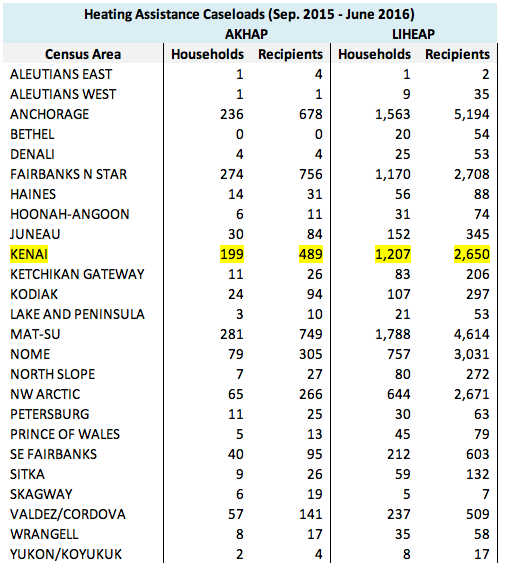One casualty of this year’s state budget cuts is an aid program that assists low-income households with their winter heating bills.
The Alaska Department of Health and Social Services’ Division of Public Assistance announced Tuesday that its Alaska Heating Assistance Program (AKHAP) will not be funded in the state budget that took effect July 1.
DHSS Public Information Officer Sarana Schell wrote in an email that the program gives households that qualify each year a one-time payment averaging approximately $560 to cover a portion of their heating bills. Between September 2015 and June 2016, around 2,100 families received this funding, Schell wrote. These included 199 families in the Kenai Peninsula census area, a total of 489 individuals.
Among Alaska’s 24 census areas, the Kenai Peninsula was the program’s fourth-largest user in the winter of 2015-2016, behind Anchorage’s 236 households served. The Mat-Su area was the heaviest user, with 281 households receiving heating assistance.
Although AKHAP will be missing this winter, a larger federal program continues to offer heating aid money. The Low Income Home Energy Assistance Program (LIHEAP) funded 1,207 Kenai Peninsula households in the 2015-2016 winter. However, the LIHEAP money — contriubuted by both the state and federal governments — will also be reduced this winter. The federal government will continue funding its portion of LIHEAP, but the state’s 30 percent LIHEAP contribution will be absent.
LIHEAP serves a lower-income group — households with annual income less than 150 percent of the federal poverty guideline. The state’s AKHAP is aimed at those immediately above that level, with annual incomes between 151 percent and 225 percent of the federal poverty level.
In addition to state and federally administered programs, local organizations give heating assistance using state and federal funding. On the Kenai Peninsula, the Kenaitze Tribe distributes LIHEAP and AKHAP-funded heating aid to qualifying Alaska Native and American Indian families. In the last fiscal year the state gave the Kenaitze Tribe $103,188, with which it gave heating assistance to 74 families, according to Roberta Turner, the Kenaitze Tribe’s acting Director of Human Services. The Kenaitze Tribe also had 170 LIHEAP clients.
Turner and Schell both said their organizations will be channeling formerly-qualified AKHAP users to alternative programs. Turner said she would refer applicants to Alaska 211, the United Way’s online database of government, nonprofit and religious social assistance programs, which she said includes heating assistance.
“Say you needed heating assistance — you would go to Alaska 211, and you could click on there and it will give you a list of organizations that provide heating assistance,” Turner said.
A search on Alaska211.org returned five organizations in Homer, Kenai and Seldovia that offer “utility payment assistance,” with three of the five in Homer.
The Alaska Housing Finance Corporation also offers an assistance program that prepares homes for colder temperatures, which Schell wrote “may be helpful in reducing heating energy needs.”
Reach Ben Boettger at ben.boettger@peninsulaclarion.com.

